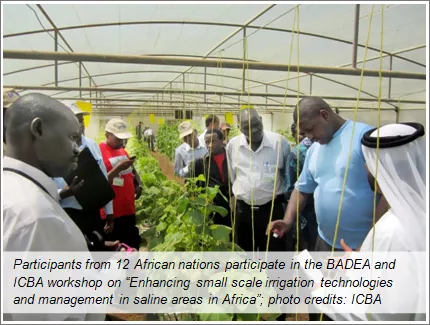Opportunities to learn about small scale irrigation technologies and management in saline areas
Staff from farmers’ extension services, research institutes and ministries from 12 African countries enjoyed two weeks of training on enhancing small scale irrigation technologies in saline areas.
Sponsored by the Arab Bank for Economic Development in Africa (BADEA) in partnership with the International Center for Biosaline Agriculture (ICBA) the training program “Enhancing small scale irrigation technologies and management in saline areas in Africa” targeted participants from Angola, Eritrea, Ghana, Kenya, Mauritius, Nigeria, Rwanda, Seychelles, South Sudan, Swaziland, Tanzania, and Zambia.
The cooperation between BADEA and ICBA dates back to 2007 and the result of the partnership has led to the training of more than 90 participants from 36 African countries in that time.
The course held 30 March to 10 April 2014 provided opportunities for those attending to increase their knowledge of small scale irrigation management in improving land management of small farms and lands affected by salinity in Africa. ICBA will hold a second workshop targeting participants from Francophone Africa in a second course being held from 11-22 May 2014.
Agriculture is the central element of economic growth and poverty reduction in Africa and it is also the main tool for the attainment of food security and alleviation of hunger on the continent”, said Mr. Mohamed El Aichouni, Chief Technical Assistance Division – Operations Department in BADEA. Mr. El Aichouni added that while the rest of the world has made significant progress towards poverty alleviation, the root cause of the food insecurity in African countries is the inability for people to gain access to food due to poverty. “As salinity continues to increasingly influence our environment there is urgency to develop cropping production systems under saline conditions.” said El Aichouni. He added that the current training course focuses on upgrading the participants’ skills in the field of improving small scale irrigation technologies and was designed essentially to enable them to evaluate lands affected by salinity; develop proper management for water and land resources; rehabilitate land affected by salinity; utilize modern water saving and low cost irrigation systems; monitor the success of adapted rehabilitation strategies of salt affected lands; and finally analyze water productivity in small farms. El Aichouni concluded, “I am sure that the much known experience and professionalism of ICBA staff has enabled you to attend the preset objectives for this course.”
During the certificate distribution ceremony, Dr. Ismahane Elouafi, Director General of ICBA, thanked the participants for their active participation and commitment during the two weeks program. Dr. Elouafi highlighted that this course could not have taken place without the direct support and partnership of BADEA. Dr. Elouafi stressed that “Africa is getting bigger on the agenda of ICBA. It is one of the areas that we would like to participate more in its development. We already started at small scale in seven countries in Sub-Saharan Africa. We are looking forward for opportunities for working in Africa and maybe through you and your network in your countries this could open a channel for identifying opportunities for collaboration”.
Participants feedback
“The course was wonderful… it was very informative; I learned new things specifically about salinity which is a new problem in my country Kenya. It has not been a common problem but now it has started, and we didn’t have the knowledge and the knowhow to deal with salinity problems. Now that I have undergone this course I know how to deal with salinity problems and when I go back to my country I will implement what I learned and I’m sure it will help.”
Ms. Charlotte Ooro, Laboratory Scientist, Ministry of Agriculture, Kenya
“No doubt the course has really been tremendous in terms of knowledge acquisition and sharing of experience. I particularly have gained a lot especially with regards to salinity management strategies and automation of irrigation schemes. This has really been beneficial to me; I hope to make good use of this knowledge and scale it down to the lowest level especially to the farming community to be aware of simple management strategies that will enhance food production and reduce salinity effect in my country.”
Mr Sani Dauda Ahmed, Nigeria, Lecturer/Research Officer at National Water Resources Institute
“I am really very pleased with ICBA and BADEA for inviting me to attend this course, which is really successful. First, I came to learn that most of our countries are suffering from soil salinity. Secondly, there is a need to come out with new methodologies, as ICBA is doing, to be implemented in the field so that we can sustain our agricultural production. I am very pleased to learn from ICBA what they have done in their field testing and hope they transfer their experiences to my country, South Sudan.”
Mr Gaudensio Veanansio Agrimuk Monia, South Sudan, Senior Soil Inspector for Soil Health, Ministry of Agriculture, Forestry, Tourism, Animal Resources, Fisheries, Cooperatives and Rural Development
“It was a really good experience… We have realized how we can use the land back home to make even better changes for agriculture. The people that prepared this course are very friendly and are well knowledgeable of the things they are doing, which was of great benefit to us. We were able to get much from them scientifically, academically and most of all practically.”
Ms Rachel Atieno Mirondo, Tanzania, Agricultural Officer, Ministry of Agriculture, Food Security and Cooperatives
